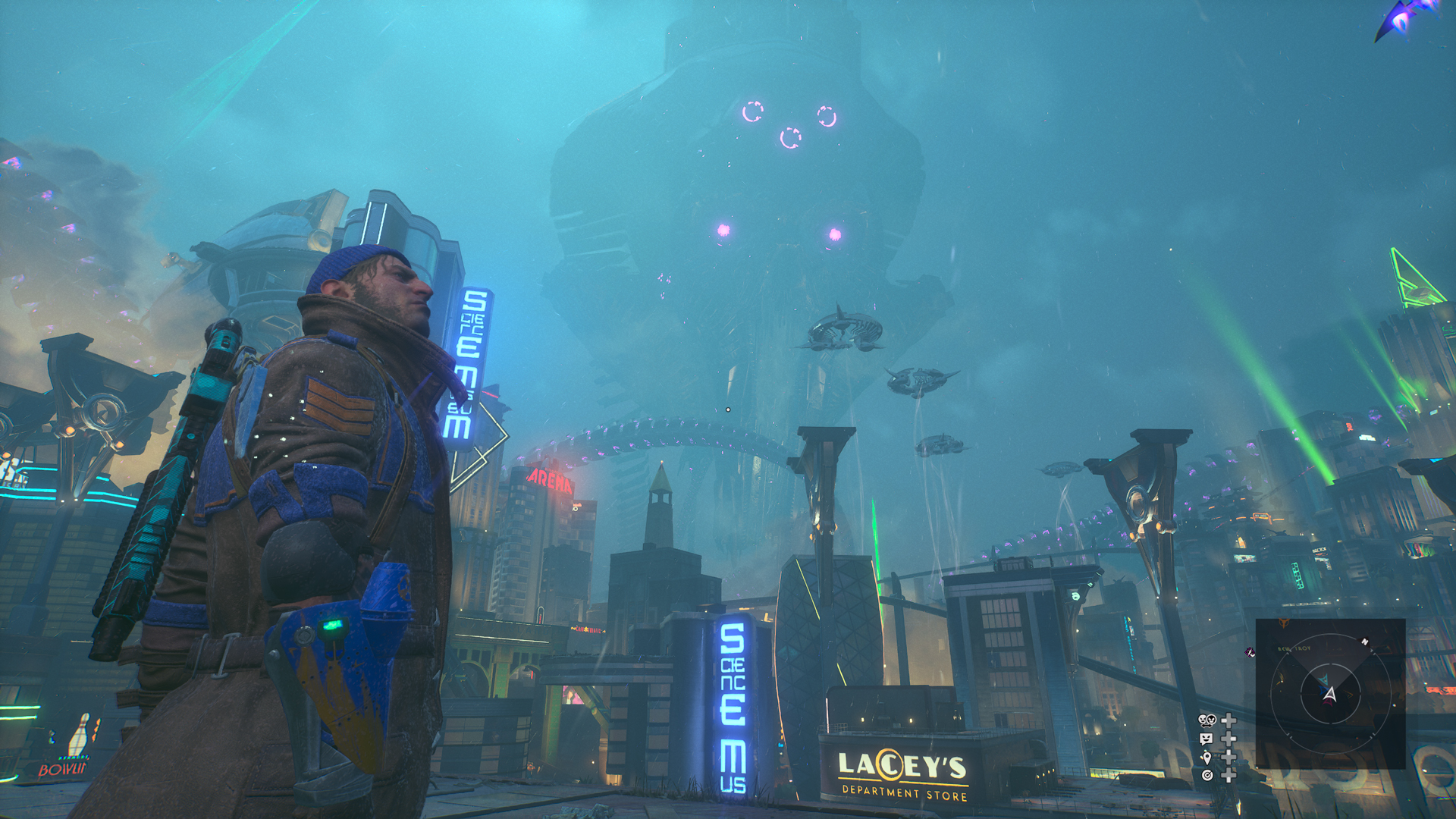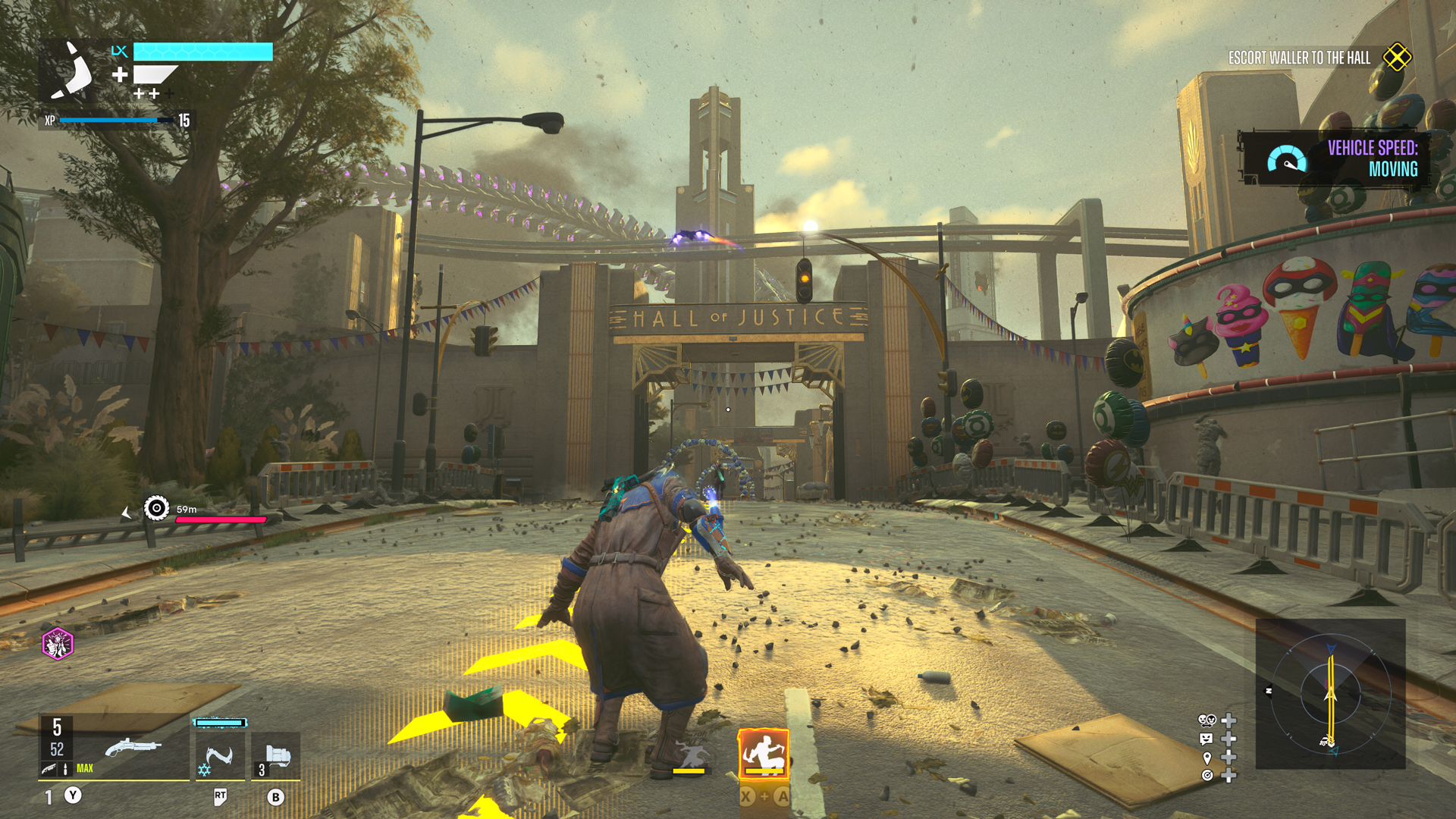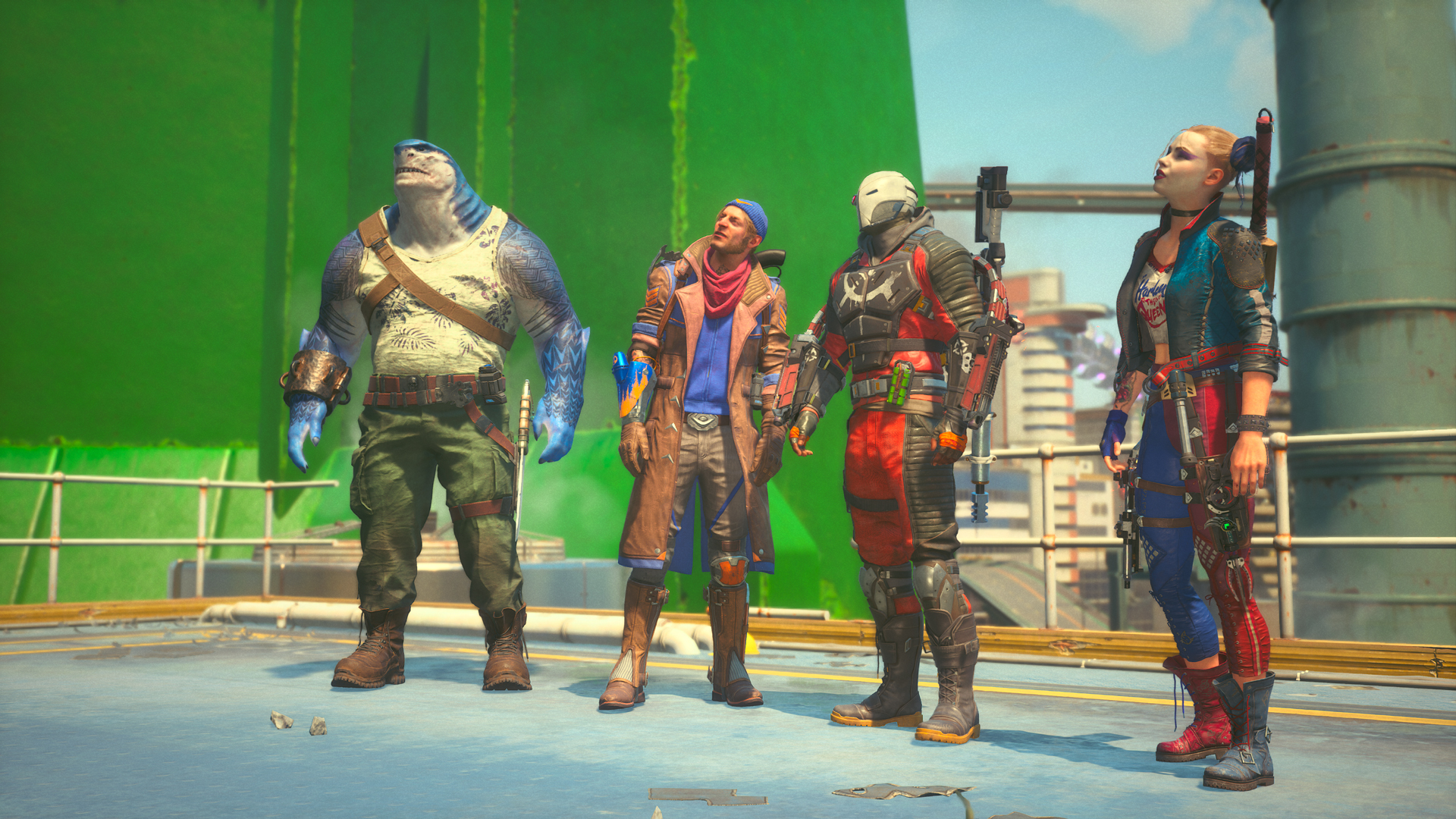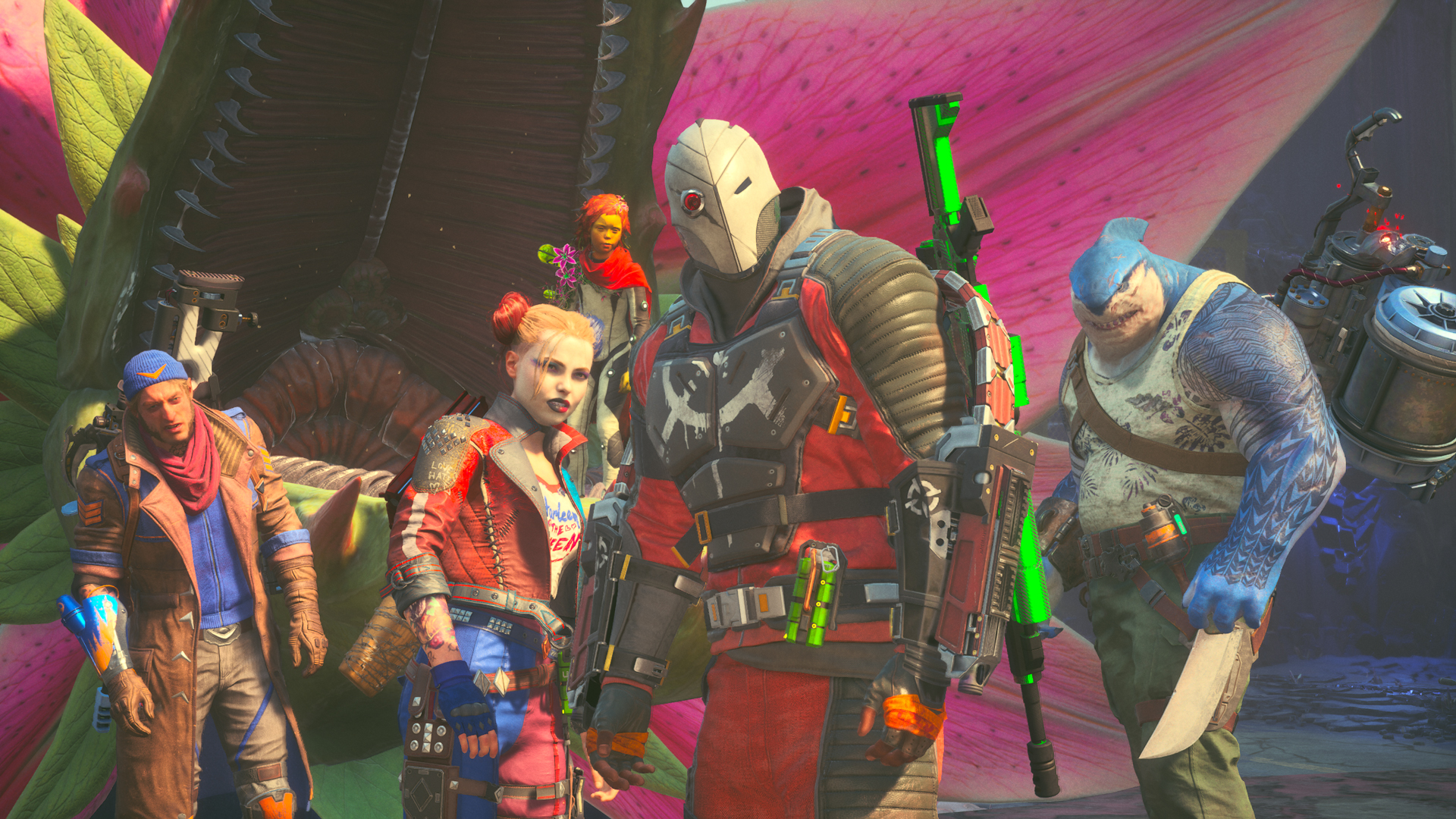GamesRadar+ Verdict
A wildly entertaining creative concept makes Suicide Squad: Kill the Justice League a captivating prospect, but repetitive mission design, a messy confluence of combat systems, and the drive towards a cooperative live service structure ultimately undermine the game's strongest qualities.
Pros
- +
Great concept
- +
Fun story
- +
Looks beautiful
Cons
- -
Lackluster combat
- -
Unwieldy traversal
- -
Slow progression
Why you can trust GamesRadar+
I have to admire Rocksteady Studios for committing so thoroughly to the bit. For the ruthless efficiency with which the developer has burned down a corner of the DC Comics universe that it had spent a decade building up. The Arkhamverse has been torn asunder, its greatest heroes are gone and its most memorable surviving villains have been locked inside the Hall of Justice as weapons vendors. A Crisis on Infinite Earths leaves surprisingly little room for the carnage to be undone in a Lazarus Pit as part of the ongoing live service story, or whatever new adventures may eventually lay beyond it.
Release date: February 2, 2024
Platform(s): PC, PS5, Xbox Series X
Developer: Rocksteady Studios
Publisher: Warner Bros. Games
Honestly, it's captivating to see a prominent studio take such a wild swing with a licensed intellectual property. Suicide Squad: Kill the Justice League tasks you with completing an impossible mission: assassinate the Earth's mightiest heroes with little reflection or remorse, or die trying. It's the sort of meteoric setup that's rarely attempted outside of comic book crossover events, where the state of play can be easily reset in a handful of panels. But despite all of its promise and potential, Suicide Squad lacks the ambition or imagination to execute such a creative concept with any real confidence.
In brightest day, in blackest night

Suicide Squad: Kill the Justice League suffocates under the weight of its scope. Its core rhythms of play ultimately blighted by wider creative decisions; a stretched structural model which faintly echoes that of The Division, and a cooperative framework that forces a homogenized approach to action, progression, and character definition. Repeating enemy encounters are the only real point of interest across an otherwise empty, sprawling open-world Metropolis, with checklist challenges fuelling trips to a single instanced hub – a claustrophobic space where you're free to catalog mountains of looted items whilst static NPCs bark empty platitudes back in your direction.
It's a far cry from the boundless ingenuity that Rocksteady used to define its Batman: Arkham trilogy. They're meticulously crafted action adventures that worked to leverage the strengths and weaknesses of one hero operating on home turf, with every combat system, level outlay, and scripted mission ultimately working in tandem to strengthen a single power fantasy. Suicide Squad: Kill the Justice League isn't able to grasp ahold of similar refinement or focus, surely a result of Rocksteady splitting its attention across four playable villains – Captain Boomerang, Deadshot, King Shark, and Harley Quinn; four wildly different characters who are ultimately born of the same basic mould here, their individual traits inherently weakened in the need to fit archetypal squad roles.

"All told, Rocksteady has delivered a dependable, if unspectacular third-person shooter"
It's a great shame that Suicide Squad: Kill the Justice League lacks definition in the areas that matter the most, because Rocksteady has done an otherwise fantastic job bringing the core cast to life once control is wrestled out of your hands. Task Force X are a fantastically written group in cutscenes; quick to quip, and even quicker to whine sardonically as they are pushed into increasingly outlandish positions. Character models are astoundingly detailed, matched with fluid animations and energetic performances. There's a playful exuberance present in the scripted scenes, and a momentum to their direction and execution which helps breathe real life into an otherwise catatonically-paced adventure.
The problems surmount once the camera reconnects with the shoulder of your preferred character. As you're shoved out of the raucous cinematics and into the derelict City of Tomorrow, the soundscape swallowed by a brainwashed Batman chattering on a comms channel and a returning Edward Nygma spouting inane environmental riddles. As you haphazardly traverse dazzling horizons to bleed unintelligent enemies of colorful numbers, the exhaustive user interface struggles to communicate an overload of perfunctory information. You slowly come to understand that Suicide Squad: Kill the Justice League is effectively quest and level design agnostic, casting the vast majority of its encounters across unidentifiable rooftops and a small set of monotonous objective types.
No evil shall escape my sight

Unique traversal and melee attacks do help lend each of the four characters a sliver of individualism, although the core cadence doesn't change all that much regardless of whether you are zipping around shielded encampments as Captain Boomerang, or struggling to maneuver King Shark and Harley Quinn with any accuracy between skyscrapers. Battles are always a hailstorm of gunfire and critical reloads – a cumbersome system in such a speedy, busy shooter, and far better suited to the more methodical pace of the Gears of War series. Shotguns and sniper rifles are snappy, and the assortment of full-auto weapons have a nice weight to them. All told, Rocksteady has delivered a dependable, if unspectacular third-person shooter.
Combat undoubtedly improves over time, as you glacially level individual characters and move down needlessly restrictive progression trees. Part of the problem here is that Suicide Squad: Kill the Justice League is overwrought with intertwining systems. The combo and counter systems from the Batman: Arkham trilogy return in a refreshed format, messily connected to contextual-melee attacks, special abilities, squad attacks, and shield regeneration – all of this working alongside elemental afflictions, grenades, and weapon modifications. The UX and controls feel overextended to accommodate, making it tricky to cleanly chain assaults and track small groups of constantly respawning enemies.
Like Warner Bros. Games' Gotham Knights before it, Suicide Squad: Kill the Justice League can be fun with friends or in short bursts of solo play. Rocksteady has delivered a premium, luxurious-looking game that could eventually settle into its live service framing as the conclusion of the story drags out across a dozen chapters. But it's difficult to ignore the fact that the studio has stumbled with the basics, failing to capitalize on its characters, drive any energy into objective or level designs, or suitably strengthen its combat systems. As a result, Suicide Squad ultimately lacks the focus and refinement that have defined so many of the best superhero games in the years since the Batman: Arkham trilogy reigned supreme.
Suicide Squad: Kill the Justice League was reviewed on Xbox Series X, with a code provided by the publisher.
More info
| Genre | Third Person Shooter |

Josh West is the Editor-in-Chief of GamesRadar+. He has over 15 years experience in online and print journalism, and holds a BA (Hons) in Journalism and Feature Writing. Prior to starting his current position, Josh has served as GR+'s Features Editor and Deputy Editor of games™ magazine, and has freelanced for numerous publications including 3D Artist, Edge magazine, iCreate, Metal Hammer, Play, Retro Gamer, and SFX. Additionally, he has appeared on the BBC and ITV to provide expert comment, written for Scholastic books, edited a book for Hachette, and worked as the Assistant Producer of the Future Games Show. In his spare time, Josh likes to play bass guitar and video games. Years ago, he was in a few movies and TV shows that you've definitely seen but will never be able to spot him in.



